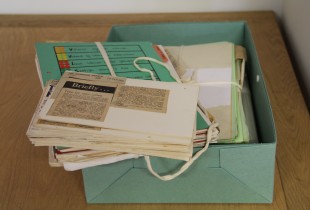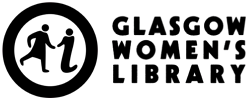In March 1990 Scottish Women’s Aid workers in Edinburgh wrote a letter to the Herald newspaper regarding a recent court case centred on domestic violence. In this case a suspended sentence was handed out to an ex-soldier for murdering his wife and baby son with the justification that he’d “suffered enough”. The workers’ letter pointed out that the judge who handed out this sentence was the same judge who, ten years earlier, had sentenced June Greig to six years in prison for killing her husband, a man who had severely abused her for years, “to deter other wives in the same position from killing their husbands”.

As the archivist at Glasgow Women’s Library and one of the project archivists on the Speaking Out Project, I look after a lot of material related to the violence against women movement. Glasgow Women’s Library holds the archives of some of the most progressive and instrumental feminist groups in Scotland of the last century. These include Scottish Women’s Aid, the Zero Tolerance campaign (the first crime prevention campaign in the UK to deal with violence against women) and the archive of the Women’s Support Project, a feminist voluntary organisation working to prevent domestic violence in the Gorbals, Glasgow. Taken together, these three collections chart the beginning of an organised campaign to prevent and publicise violence against women in Scotland.
Whilst working on these collections I have read too many stories of how women not only suffered at the hands of their partners but also at the hands of a gender biased legal system. Needless to say these have made me terribly angry and sad but somehow this letter and the tragic stories within it really stood out.
The Scottish Women’s Aid archive contains a collection of news cuttings from both broadsheets and tabloids featuring numerous stories like this and containing information on violence against women and children; housing; sexism; racism and legal reform. The collection also contains material documenting the activities of Women’s Aid in Scotland dating from its beginnings in 1976 onwards and charting its high profile and often-influential work. It documents the beginnings of an organisation that would go on to be a source of information and support for women, influence legislative change and also give women experiencing domestic violence a voice. The collection is an important resource at local, national and international levels. It is frequently used by students and other researchers from different backgrounds and researching different topics.
Throughout the course of the project, the archive will develop and grow, not only from the addition of the oral histories but also through additions of material from local branches and the public who will hopefully donate material, filling gaps in the existing collection and adding rich layers to the existing narratives. The archive will also undergo work to make it more accessible through the work of myself and my fellow project archivist, Amy, but also by project volunteers. We aim to create a comprehensive catalogue, which will be published online and we will go on to select key pieces for digitization increasing the collections accessibility. I am looking forward in helping to create this important resource and playing a part in celebrating the history of a remarkable organisation.

Comments are closed.